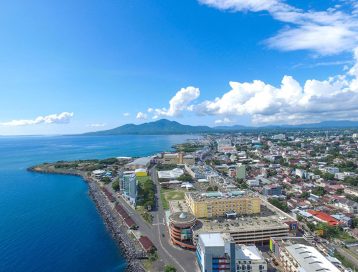Dutch polder concept as new land reclamation method at Pulau Tekong
Singapore reclaimed land through the development of a polder at the north-western tip of Pulau Tekong, an island north-east of mainland Singapore. This cost-saving method, used for the first time in Singapore, has been adopted by the Housing and Development Board (HDB) for the land reclamation project. The polder has recently been successfully completed in September 2025, with an additional 810 hectares of new land to Singapore.

Deltares worked closely with HDB since 2008 on the feasibility of the polder concept for Pulau Tekong. Deltares experts in The Netherlands and in Singapore subsequently provided specialist advice to HDB from 2021 to date, including carrying out an environmental study and an extensive review of the detailed design and contract documents.
You have not yet indicated whether you want to accept or reject cookies. This means that this element cannot be displayed.
Or go directly to:
New polder development first-of-its kind in Singapore
Unlike the traditional method of spraying sand, this land reclamation method involved reclaiming land from the sea by constructing a dyke and a drainage network with pumping systems and canals. This reduced the amount of sand needed for land reclamation by almost 50% and saved on the initial construction costs.
The polder lies 1.2 metres below sea level and is protected from the sea by a 10-kilometre-long dyke with a crest width of up to 15 metres and a height of 6 metres above sea level. The dyke can be raised in the future to keep pace with rising sea levels.
To cope with the large amount of rainfall in Singapore, an integrated water management system has been constructed: a 116-hectare stormwater basin with a capacity of 5 million m³ of water, 45 kilometres of drainage channels and more than 30 water inlets and outlets, plus two pumping stations to circulate water and discharge it into the sea.
Involvement of Dutch expertise
With Deltares as specialist consultant, Professor Kees d’Angremond (who passed away in 2024) as expert advisor, Haskoning/Surbana as engineering consultant, and Boskalis and Penta Ocean as contract, HDB has drawn on the vast experience of the Netherlands throughout the project. Jointly, these parties have ensured that the design and implementation of the polder at Pulau Tekong is cost-effective, safe and environmentally-sensitive. It provides the highest protection level in the world, but is also designed according to the latest standards and state of the art knowledge regarding flood defences and water management.
Since 2017 Deltares also is involved in the design and implementation of the operational water management system of the polder, including early warning systems and hydro information system.




